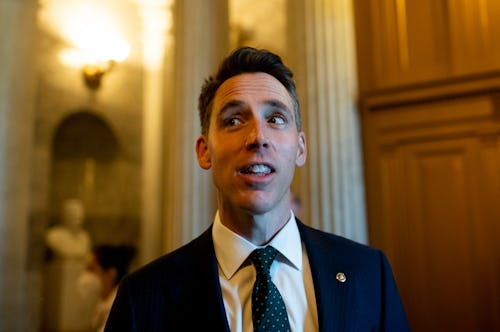Seditionist Sen. Josh Hawley fist-pumps his support for Russia
As Biden moves troops around in Eastern Europe to protect Ukraine, Hawley says the whole NATO thing isn’t that big a deal anyway.

There’s something of a seismic realignment going on in the right-wing corners of the country’s foreign policy discourse. Fueled in no small part by the twin forces of a fascist, nationalist common cause between European and American conservatives and former President Donald Trump’s vocal antipathy toward China, that country has begun to supplant Russia as the United States’s big bad 21st-century adversary among Republicans. Practically speaking, that shift is best embodied by Missouri Sen. Josh Hawley, he of “fist-pumping solidarity with a mob of violent seditionists” fame.
With Russian forces massing along the country’s border with Ukraine, and America shifting its European troop positions to complement that potential threat, Hawley has suddenly come out strongly against the longstanding U.S. policy supporting Ukraine’s eventual inclusion in NATO. In a letter to Secretary of State Antony Blinken obtained by Axios, Hawley asked for “clarification” on the implications of allowing Ukraine into the far-reaching military alliance that has served to regulate geopolitical relations across Europe for decades.
“It is not clear that Ukraine’s accession would serve U.S. interests,” Hawley said. “Indeed, deteriorating conditions in the global security environment caution otherwise.”
Now, a reasonable person might see a massive buildup of Russian troops preparing to move westward and think “clearly that’s the ‘deteriorating condition’” Hawley is talking about. But Hawley, dubbed “one of the worst human beings, and a self-aggrandizing con artist” by his fellow Republican, Illinois Rep. Adam Kinzinger, is hardly a reasonable person.
“Already, President Biden has announced that the United States will send more conventional forces to Europe, if Russia invades Ukraine,” Hawley writes, after blandly noting that he supports the administration sending “assistance” to Ukraine in the face of a potential invasion. But when it comes to actual boots on the ground, he continued:
Such a deployment can only detract from the U.S. military’s ability to ready and modernize forces to deter China in the Indo-Pacific. But those opportunity costs pale in comparison to what would be expected — indeed, required — of the United States, were NATO actually to admit Ukraine as a member.
Indeed, shortly after his letter was obtained and published by Politico, Hawley doubled down in a brief scrum with reporters, whining about Biden’s decision to shuffle troop positions and calling it a “bad idea” and the product of “the most disastrous administration for American foreign policy since the Vietnam War,” which ... hmmmm?
Asked later about Hawley’s comments, White House Press Secretary Jen Psaki dismissed them, and their source, saying, “If you are digesting Russian misinformation and parroting Russian talking points, you are not aligned with longstanding bipartisan American values.”
Hawley isn’t alone in his “hey man, Eastern Europe isn’t such a big deal anymore” pivot away from the foreign policy mainstream. Donald Trump’s many oblique connections to Russia and lax stance thereof, as well as the embrace of Eastern European-style ultranationalism by conservative figureheads like Steve Bannon and Tucker Carlson, have essentially succeeded in shifting focus from Russia elsewhere — particularly China, whose economic ascendency and conspiracy-laden role in the pandemic have dovetailed to make it an object of intense (if unfocused) furor from the right.
Meanwhile, there are actual Russian troops seemingly prepared to cross into Ukraine at a moment’s notice — picking up where they left off in 2014, and marking one of the biggest military incursions in European history since WWII. But if you’re Josh Hawley, someone who has already demonstrated little regard for democracy at home, well, that’s just no big deal.